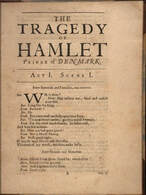|
Hamlet is not only one of the more popular of Shakespeare's works, but his keystone—that pivotal play in his cannon that marks a distinct shift from "early Shakespeare" to "late Shakespeare". Gone are the histories and high comedies of the 1590s—Post-Hamlet is marked by tragedy, "problem plays", and romances.
My goal in these essays is to tease out the questions about the play that fascinate me, while also keeping the bigger picture in mind. I want to trace the parallels between the pre- and post-Hamlet plays to explore how the shadow of the melancholy prince looms over the later works.
These essays are Protean: they are not meant to be polished (at this point), but reflections of my current theories and my evolving style.
I put these out here for the general good. Outside of theatres and the ivory tower, Shakespeare remains a subject of interest for the general public and, in particular, schools. While I think Shakespeare is a bit over-glorified in schools, a goal of mine is to help educators and students gain a better appreciation for the works.
Thank you for reading, and please feel free to engage with what you find here.
My goal in these essays is to tease out the questions about the play that fascinate me, while also keeping the bigger picture in mind. I want to trace the parallels between the pre- and post-Hamlet plays to explore how the shadow of the melancholy prince looms over the later works.
These essays are Protean: they are not meant to be polished (at this point), but reflections of my current theories and my evolving style.
I put these out here for the general good. Outside of theatres and the ivory tower, Shakespeare remains a subject of interest for the general public and, in particular, schools. While I think Shakespeare is a bit over-glorified in schools, a goal of mine is to help educators and students gain a better appreciation for the works.
Thank you for reading, and please feel free to engage with what you find here.
